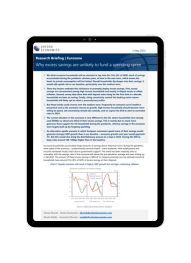Eurozone: Why excess savings are unlikely to fund a spending spree

We think eurozone households will be reluctant to tap into the €1tn (8% of GDP) stock of savings accumulated during the pandemic-stricken years, at least in the near term, which means the boost to private consumption will be limited. Should households dip deeper into their savings, it would add upside risk to our baseline, particularly over the medium term.
What you will learn:
- Three key factors underpin this reluctance to promptly deploy excess savings. First, excess savings are concentrated among high income households and mostly in illiquid assets to offset inflation. Second, survey data show that with deposit rates rising for the first time in a decade, households are keen on saving.
- These trends could reverse over the medium term. Propensity to consume out of wealth is procyclical and as the eurozone returns to growth, high income households should become more willing to spend.
- The current situation in the eurozone is very different to the US, where households have already used $800bn or about one-third of their excess savings.
- An alternative upside scenario in which European consumers spend more of their savings would generate stronger GDP growth than in our baseline – eurozone growth next year would approach 3%.
Tags:
Related Services

Service
City Scenarios Service
Assess the impact of risk scenarios on cities and regions Our service provides a baseline forecast and three alternative scenarios for a broad range of economic and demographic indicators for each location.
Find Out More
Service
Global Risk Service
A suite of data-driven and forward-looking tools that provide an objective and transparent measure of risk.
Find Out More
Service
Real Estate Forecasts and Scenarios
Understand the prospects and risks to your real estate investments by location and property type.
Find Out More